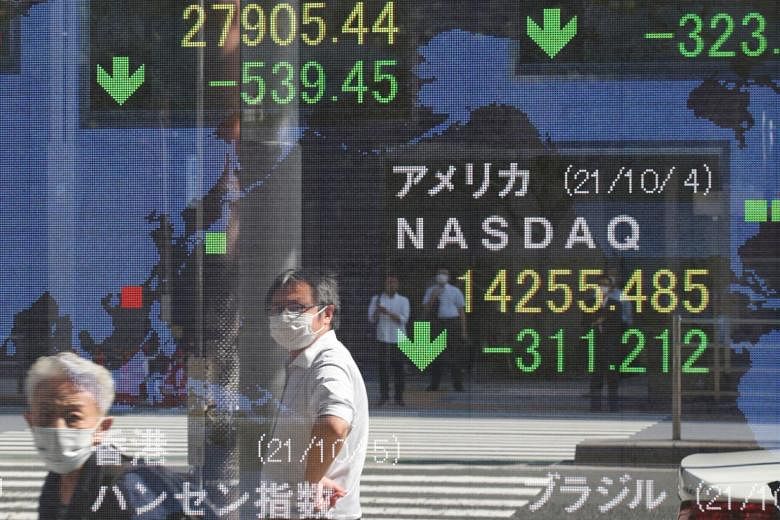SINGAPORE (REUTERS) - Asian stocks slipped on Thursday (Oct 21) as the upbeat mood that carried the Dow Jones and Bitcoin to records a day earlier ran out of steam, replaced by fresh worries about the weakening Chinese property sector as a possible default by China Evergrande Group looms within days.
The more cautious tone looked set to take hold globally as well, with European futures and FTSE futures down 0.3 per cent and S&P 500 futures dipping 0.2 per cent.
MSCI's broadest index of Asia-Pacific shares outside Japan fell 0.3 per cent after briefly touching a one-month high. Japan's Nikkei fell 1.7 per cent as the safe-haven yen rose broadly. Hong Kong's Hang Seng Index lost 1 per cent, while the Shanghai Composite was flat.
Singapore's Straits Times Index was down 0.2 per cent at 1.36pm local time.
Commodities also eased, with Brent crude futures down 0.2 per cent after touching a three-year top and Chinese thermal coal futures extending a pullback in the wake of signals that Beijing will intervene to cool prices.
"The US stock market has gone up for six days in a row, Bitcoin's made a record and the US bond market is calm. On the surface, it looks benign," said Mr Andrew Ticehurst, a rates strategist at Nomura in Sydney.
"But below the surface, we are uncomfortable about a number of things," he added, referring to chiefly the slowdown in China's economy seen in data earlier this week, and concerns about potential fallout from Evergrande's troubles.
Evergrande has secured an extension on one defaulted bond, financial news provider REDD reported on Thursday, as the company scrambles for cash before a grace period for a dollar bond coupon payment expires on Saturday.
Late on Wednesday, Evergrande said a deal to sell a US$2.6 billion (S$3.5 billion) stake in its property services unit failed and its shares fell 12 per cent in Hong Kong on Thursday.
Shares in rival developers drew support, thanks to reassurance from a number of top Chinese officials that the trouble in the sector would not be allowed to escalate into a full-blown crisis, but global investors remain nervous.
"We may see more Evergrande headlines weighing on China markets into the end of the week as the first 30-day grace period on unpaid offshore bonds approaches," said Mr Jeffrey Halley, an analyst at broker Oanda.
Wall Street had offered a positive lead after earnings helped the Dow Jones touch an all-time high and left the S&P 500 within a whisker of its record-closing high.
The VIX volatility index, sometimes referred to as Wall Street's "fear gauge", dropped to a two-month low.
But a soft finish on the Nasdaq flowed through to the selling of tech stocks in Tokyo and in Hong Kong, where the Hang Seng fell 0.8 per cent.
Longer-dated Treasury yields steadied after rising with inflation and growth expectations on Wednesday, with the benchmark 10-year yield at 1.6568 per cent, just below the previous day's five-month high of 1.673 per cent.
Investors have figured that surging energy prices and tightening job markets will pressure policymakers in the United States and elsewhere to raise interest rates before long, but stocks have scarcely reacted to shifts in rates pricing.
Fed funds futures have priced a US rate hike of 25 basis points in the third quarter of 2022, while Eurodollar markets expect higher rates as soon as the second quarter.
"In our view, the dollar and yen face upside risks if inflation concerns spark a sharp tightening in global short-term interest rates and a sharp pullback in equity markets," said Commonwealth Bank of Australia currency analyst Carol Kong.
The yen rose 0.3 per cent to 114.06 per dollar last Friday and steadied against other currencies after a long slide. The Australian dollar dipped 0.2 per cent to US$0.7501 after touching a three-month high.
China's renminbi hovered at its strongest level in four months against the greenback, after the central bank set its official midpoint rate on Thursday at below 6.4 per dollar for the first time since June.
Investors are growing nervous over the authorities' apparent absence of concern about the renminbi's recent ascent, which has also taken it to its strongest level in six years against the currencies of China's major trading partners.
Bitcoin, which hit a record on Wednesday in the wake of the US listing of a futures-based exchange-traded fund, eased from its peak to US$64,951.

